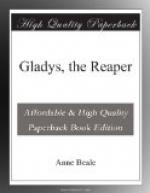‘And mamma nearly,’ said Mrs Vaughan. ’And I am tho tired. I think Chrithmath dayth are very dull. One dothn’t know what to do.’
‘That isn’t peculiar to Christmas days in your year,’ said the colonel, sarcastically; ’but I suppose we had better go to bed. I hope we shall be more amusing to-morrow, Freda. All your old friends, the constant Sir Hugh amongst them, are invited to meet you. Let me light your candle. Remember, I always used to do that, when we had our snug evenings together such an age ago.’
’Yeth, he often talkth of you, Freda, and thayth you were thuch good company.’
Freda heard Colonel Vaughan sigh, and thought, as she said ‘good-night,’ and hastened upstairs, that she ought to be thankful that the imperturbable and dull Wilhelmina Nugent had been the choice of that discontented and irritable colonel, instead of the quick-tempered, independent Winifred Gwynne.
CHAPTER XLVII.
THE DAUGHTER-IN-LAW.
New Year’s Day dawned under the influence of a bright sun, and a clear, frosty atmosphere. The old year was dead and buried with all his griefs and joys; his son and heir came forward smiling, to begin his career of times and seasons, clouds and sunbeams.
With him, Owen and Gladys were to commence their united lives. An auspicious morning ushered in this, their bridal day, and the year’s birthday. Nature had put on all her jewels in honour of the joint festivities. Her very tears were turned into diamonds that sparkled on her capacious breast, neck, and arms, more brilliantly than stomachers, necklaces and bracelets of gems, on the courtiers of an Indian monarch.
Truly, as the fair and gentle Gladys drove through the roads and lanes that led from the farm to the church, the hedge-rows sparkled with these brilliants, and her very pathway was strewn with them. Attired in that Quaker-like garb of dove-colour and white, her soft cheek tinged as from the sun, her eyes cast down in modest shyness, and her heart beating with quiet happiness, she seemed a fitting bride to wait upon that heir of so many by-gone generations.
And assuredly a happier never drove to a church to meet her expectant bridegroom, her hand clasped lovingly between the kindly palms of her future mother, sitting by her side; and the affectionate glances of her uncle and aunt cast upon her from the opposite seat. She felt as if it were all a dream. She, the Irish beggar—the friendless—the wanderer—the orphan!
And now so honoured! All whom she most cared for in the world, with the exception of Rowland, were assembled in that village church to meet her. There were Owen and his father—Miss Gwynne and Minette—Mr and Mrs Jonathan Prothero.
Gentleness, gratitude and simple merit, were, for once rewarded, even in this world.
The kind and worthy Uncle Jonathan—so soon to be her uncle—married her. Her own uncle gave her, with prayers and blessings, to him whom she had loved so long and truly—her former mistress, now her fast friend, and another mistress’s grandchild, were her bridesmaids.




